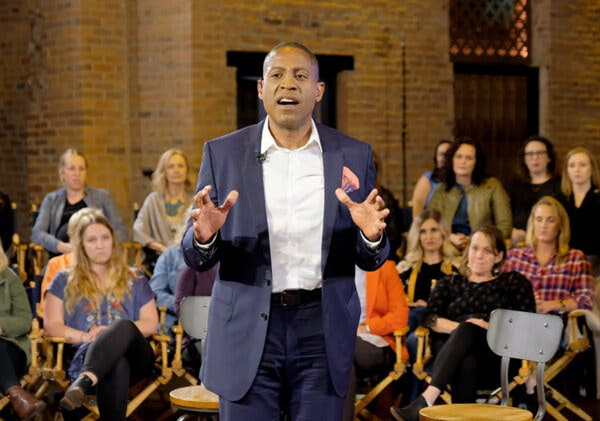|
NEWS ANALYSIS |
 |
|
Lifestyles of the Rich and Gullible: Theranos and
Ozy Edition
Average investors were not able to get
in on the last decade’s start-up boom in private markets. Once that
seemed unfair. Now it looks lucky.
|

Elizabeth A. Holmes, the former Theranos chief executive, and
her partner, Billy Evans, leaving federal court after the first
day of her fraud trial in San Jose, Calif., last month.
Mike Kai Chen for The New York Times |
Oct. 9, 2021
Ozy Media told investors it had “strong financial performance,
seemingly impressive viewership metrics and significant institutional investor
interest,” according to a firm that heard the pitch. In return, it got $2
million in funding, adding to its $83 million haul. Last week, that firm sued,
alleging fraud and concealment.
Elizabeth Holmes used endorsements from pharmaceutical companies
to convince investors that machines made by Theranos, her blood testing
start-up, could conduct hundreds of tests using a finger stick of blood. They
gave her nearly $1 billion. Those endorsements, among many of Ms. Holmes’
claims, were fabricated, according to arguments made by federal prosecutors in
court last month.
In the three years since Ms. Holmes was charged with defrauding
investors about Theranos, other prominent investors have revealed how they were
convinced to give significant backing to start-ups that defied logic. WeWork
claimed it had a
healthy, profitable
business when it was setting cash on fire. Nikola, an autonomous
trucking company, rolled
a truck down a hill to show its vehicles could drive itself.
These start-up scandals have given the world memes, Halloween
costumes and ironic
swag. But more than anything, their stories are a source of plain old
schadenfreude.
When the dot-com bubble of the ’90s came crashing down, the main
street Joe and Jane investors who poured their retirement funds into doomed
start-up stocks were easily painted as sympathetic victims. But the last
decade’s start-up boom happened in the private markets, with blessings of
unicorns — private companies worth $1 billion or more — galloping the hills of
Silicon Valley, collecting seemingly limitless cash primarily from the very
wealthy.
People below a certain net worth are, by law, not allowed to
invest in these magical ungulates. The privilege of writing a check to an
ambitious founder’s private start-up is something people fight for, and market
watchers have bemoaned the fact that the less well-off were missing out on the
opportunity to invest in hot ventures before they took off.
So when a start-up implodes, the venture capitalists, the
celebrities and the billionaires are the ones who lose. It is Rupert Murdoch,
who backed Theranos, or Laurene Powell Jobs, who invested in Ozy Media.
|

Carlos Watson co-founded Ozy in 2013.
Jason Kempin/Getty Images |
The drumbeat of high-profile implosions serves as a
reminder of how risky the start-up gamble is — and how frequently
companies stretch the truth to get ahead. If the wealthy were supposed
to have the resources and sophistication to do their diligence, the
scandals show they didn’t — or at least, they didn’t care. They wrote
huge checks based on data that made no sense or promises that didn’t
add up. In start-up land, the cautionary tales loom as large as the
success stories; hurdles to regular investors getting in early are
looking like a lucky break.
Not long ago, we lived vicariously through the 1 percent by
watching “Lifestyles of the Rich and Famous” or “Cribs.” Now, we obsess over the
details of how they were duped. In San Jose, Calif., where Ms. Holmes’s trial
has been happening for the past month, multiple book clubs that read “Bad
Blood,” which chronicles the downfall of Theranos, have made pilgrimages to
catch a glimpse of her in the courtroom. One eager attendee told me she was “a
fan of white-collar crime.”
The bubbling zeal for grift mirrors the rise of the “murderinos,”
or fans of true murder stories. We feel relief that we’re not the victim. Few
among us are likely to lose millions — or hundreds of millions — on a shady
start-up bet.
“Psychological distance enables us to laugh at things that, if
they happened to us, we would be ashamed, embarrassed or hurt by,” said Peter
Atwater, an adjunct professor at the College of William & Mary who researches
confidence in decision making. “Finally, some of the rich have been as deceived
as we, the poor.”
For so-called fans of white-collar crime, the start-up scam
cannon offers a growing bounty to feast on. There is the recent revelation that
an Ozy
executive impersonated a representative from YouTube on a call with
Goldman Sachs to try to secure an investment. There are the doctored invoices
that Manish Lachwani used to inflate revenues of HeadSpin, the software company
he founded, in order to obtain $60 million in funding, according to a recent
criminal indictment. (HeadSpin said it returned funds and has
cooperated with investigators.) There’s the fraudulent insurance reimbursement
requests at uBiome, the poop testing start-up whose founders, officials said,
misled investors about their business in order to raise $65 million, leading
prosecutors to charge them with more than 40
counts of fraud in February. There are the private investigators and
legal bullying tactics that Theranos used to intimidate whistle-blowers, according
to recent court testimony.
They follow a formula as old as “The Music Man.” A charismatic
founder paints themselves as a visionary disrupter. Ms. Holmes said Theranos’s
blood analysis machines could deliver hundreds of medical tests quickly and
cheaply from a single drop of blood. That promise appealed to people like
General James Mattis, who
testified that he saw the potential to save lives on the battlefield,
or Steve Burd, the former chief executive of Safeway who
testified that putting the machines in stores would open up an
exciting new line of business for the grocery chain.
Once one wealthy person buys in, the founder can use that
benefactor’s credibility to collect a stable of ever-powerful supporters. In
Theranos’s case, George Shultz, the former secretary of state, introduced Ms.
Holmes to his friends at the Hoover Institution, including Henry Kissinger and
Mr. Mattis. Everyone assumes the first investor asked all the hard questions.
Further probing is brushed off as a trade secret.
The claims can be flimsy. Theranos projected $990 million in
revenue in 2015. The reality, it was revealed in court, was closer to zero. Ozy
Media claimed it had written the first stories on influential people like Trevor
Noah and Alexandria Ocasio-Cortez. It had
not. Jessica Richman, a co-founder of uBiome, told reporters she
qualified for “under 30” and “under 40” lists. She was over 40, according to the
indictment. Mr. Neumann promised that by 2018, WeLive, WeWork’s apartment side
project, would have $600 million in revenue, according to “The
Cult of We,” a book on the company. It never expanded beyond two
buildings with a few hundred units.
It is worth noting, in tallying this chapter of start-up history,
that Ms. Holmes has pleaded not guilty to all criminal charges. And, in contrast
to that ongoing case and others, WeWork and Ozy have not been charged with
criminal fraud.
To those watching from the sidelines, it all looks so obvious.
But beneath the know-it-all tweets, there is a creeping sense that the
psychological distance between the masses of 401(k) investors and the
billionaire marks may not be that far.
More regular people are
finding ways to invest in start-ups via new tech platforms and
evolving securities rules, adding to a bubbly, inflated environment for start-up
investing. Private tech companies raised a record high of $156 billion last
year, fivefold that of a decade ago. This week a website called Visionrare began
offering fantasy start-up investing via non-fungible tokens, or NFTs.
(It shuttered after
one day, citing unexpected legal complexities.)
Meanwhile, stock trading became a pandemic pastime just as more
start-ups began going public via special purpose acquisition vehicles, allowing
them to skirt certain disclosure and marketing restrictions. And low interest
rates, combined with an abundance of cash in the financial system, has pushed
investors of all stripes to take on more risk, leading to manias in
everything from stocks and cryptocurrencies to trading cards to wine. Top it off
with the enduring reality of modern media that charisma will always seem more
compelling than competence.
Against that backdrop, Ozy and Theranos look like early warning
signs, not outliers.
The most extreme scenarios always fail first, Mr. Atwater said.
“There are hundreds, if not thousands more that are likely to fail if confidence
continues to deteriorate.”
Erin Griffith reports on technology start-ups and venture capital from the San
Francisco bureau. Before joining The Times she was a senior writer at Wired and
Fortune.
A version of this article appears in print on Oct. 10, 2021, Section BU,
Page 3 of the New York edition with the headline: The Lifestyles of the Rich and
Gullible.
© 2021 The
New York Times Company